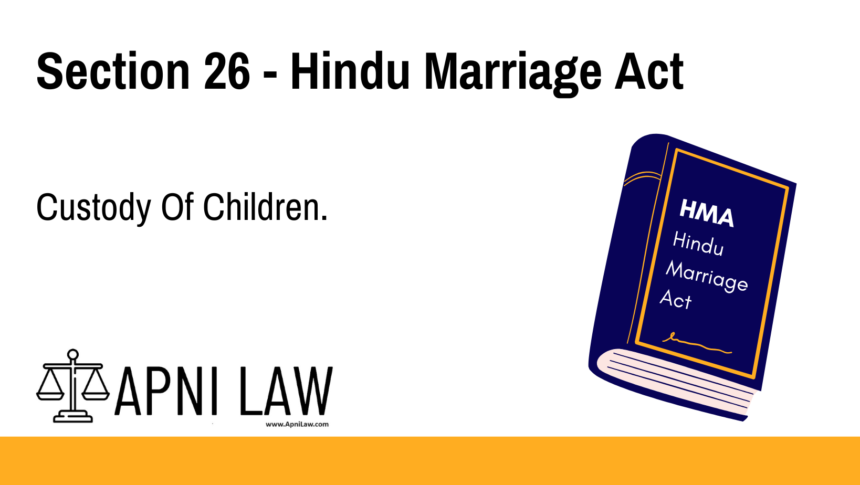Hindu Marriage Act, Section 26: Custody of Children
Code:
In any proceeding under this Act, the court may, from time to time, pass such interim orders and make such provisions in the decree as it may deem just and proper with respect to the custody, maintenance, and education of minor children, consistently with their wishes, wherever possible. After the decree, upon application by petition for the purpose, the court may make all such orders and provisions with respect to the custody, maintenance, and education of such children as might have been made by such decree or interim orders if the proceeding for obtaining such decree were still pending. The court may also from time to time revoke, suspend, or vary any such orders and provisions previously made.
Provided that the application concerning the maintenance and education of the minor children, pending the proceeding for obtaining such decree, shall, as far as possible, be disposed of within sixty days from the date of service of notice on the respondent.
Explanation:
This section empowers the court to make orders regarding the custody, maintenance, and education of minor children in divorce or separation proceedings. It emphasizes the court’s discretion to determine what is just and proper in each case, considering the children’s welfare as paramount.
- Custody: The court can decide who has the primary responsibility for the child’s care and upbringing. This can be with one parent, both parents, or even a third party.
- Maintenance: The court can order one or both parents to financially support the child. This includes providing for their basic needs like food, clothing, shelter, and education.
- Education: The court can specify the type of education the child should receive, including the choice of school and the level of education.
- Children’s Wishes: The court must consider the children’s wishes, wherever possible. This is particularly relevant for older children who have the capacity to express their preferences.
- Flexibility: The court can make interim orders during the proceedings and final orders after the decree. These orders can be modified as needed to address changes in circumstances.
- Timebound Maintenance Applications: The provision requires the court to dispose of applications for maintenance and education of minor children, pending the decree proceedings, within 60 days of serving notice on the respondent.
Illustration:
In a divorce case, the parents disagree about the custody and maintenance of their two children, aged 8 and 10. The court, considering the children’s best interests, may order joint custody, with the mother having primary physical custody and the father having visitation rights. The court may also order the father to pay monthly maintenance for the children.
Common Questions and Answers:
Q: Who decides the custody of children in a divorce?
A: The court decides the custody of children, prioritizing their welfare and considering factors like their age, relationship with each parent, and the suitability of each parent’s home environment.
Q: Can a child express their preference about custody?
A: Yes, the court must consider the child’s wishes, especially for older children who can express their preferences. However, the court is not bound by the child’s wishes and will make the decision that is in their best interests.
Q: How is maintenance for children determined?
A: The court considers the parents’ financial capabilities and the child’s needs when determining maintenance. This can include the cost of food, clothing, housing, education, and healthcare.
Q: Can custody orders be changed later?
A: Yes, custody orders can be changed if there is a significant change in circumstances. This could include a change in the parent’s living situation, the child’s needs, or the child’s relationship with each parent.








